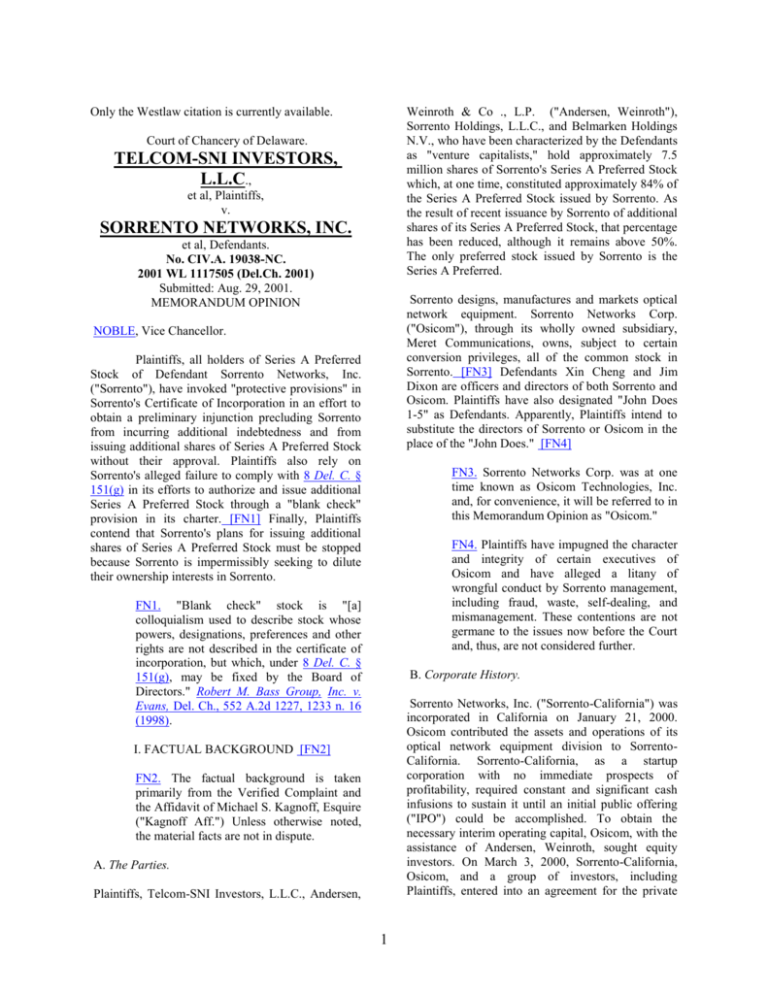Telcom-SNI
advertisement

Only the Westlaw citation is currently available. Weinroth & Co ., L.P. ("Andersen, Weinroth"), Sorrento Holdings, L.L.C., and Belmarken Holdings N.V., who have been characterized by the Defendants as "venture capitalists," hold approximately 7.5 million shares of Sorrento's Series A Preferred Stock which, at one time, constituted approximately 84% of the Series A Preferred Stock issued by Sorrento. As the result of recent issuance by Sorrento of additional shares of its Series A Preferred Stock, that percentage has been reduced, although it remains above 50%. The only preferred stock issued by Sorrento is the Series A Preferred. Court of Chancery of Delaware. TELCOM-SNI INVESTORS, L.L.C., et al, Plaintiffs, v. SORRENTO NETWORKS, INC. et al, Defendants. No. CIV.A. 19038-NC. 2001 WL 1117505 (Del.Ch. 2001) Submitted: Aug. 29, 2001. MEMORANDUM OPINION Sorrento designs, manufactures and markets optical network equipment. Sorrento Networks Corp. ("Osicom"), through its wholly owned subsidiary, Meret Communications, owns, subject to certain conversion privileges, all of the common stock in Sorrento. [FN3] Defendants Xin Cheng and Jim Dixon are officers and directors of both Sorrento and Osicom. Plaintiffs have also designated "John Does 1-5" as Defendants. Apparently, Plaintiffs intend to substitute the directors of Sorrento or Osicom in the place of the "John Does." [FN4] NOBLE, Vice Chancellor. Plaintiffs, all holders of Series A Preferred Stock of Defendant Sorrento Networks, Inc. ("Sorrento"), have invoked "protective provisions" in Sorrento's Certificate of Incorporation in an effort to obtain a preliminary injunction precluding Sorrento from incurring additional indebtedness and from issuing additional shares of Series A Preferred Stock without their approval. Plaintiffs also rely on Sorrento's alleged failure to comply with 8 Del. C. § 151(g) in its efforts to authorize and issue additional Series A Preferred Stock through a "blank check" provision in its charter. [FN1] Finally, Plaintiffs contend that Sorrento's plans for issuing additional shares of Series A Preferred Stock must be stopped because Sorrento is impermissibly seeking to dilute their ownership interests in Sorrento. FN3. Sorrento Networks Corp. was at one time known as Osicom Technologies, Inc. and, for convenience, it will be referred to in this Memorandum Opinion as "Osicom." FN4. Plaintiffs have impugned the character and integrity of certain executives of Osicom and have alleged a litany of wrongful conduct by Sorrento management, including fraud, waste, self-dealing, and mismanagement. These contentions are not germane to the issues now before the Court and, thus, are not considered further. FN1. "Blank check" stock is "[a] colloquialism used to describe stock whose powers, designations, preferences and other rights are not described in the certificate of incorporation, but which, under 8 Del. C. § 151(g), may be fixed by the Board of Directors." Robert M. Bass Group, Inc. v. Evans, Del. Ch., 552 A.2d 1227, 1233 n. 16 (1998). B. Corporate History. Sorrento Networks, Inc. ("Sorrento-California") was incorporated in California on January 21, 2000. Osicom contributed the assets and operations of its optical network equipment division to SorrentoCalifornia. Sorrento-California, as a startup corporation with no immediate prospects of profitability, required constant and significant cash infusions to sustain it until an initial public offering ("IPO") could be accomplished. To obtain the necessary interim operating capital, Osicom, with the assistance of Andersen, Weinroth, sought equity investors. On March 3, 2000, Sorrento-California, Osicom, and a group of investors, including Plaintiffs, entered into an agreement for the private I. FACTUAL BACKGROUND [FN2] FN2. The factual background is taken primarily from the Verified Complaint and the Affidavit of Michael S. Kagnoff, Esquire ("Kagnoff Aff.") Unless otherwise noted, the material facts are not in dispute. A. The Parties. Plaintiffs, Telcom-SNI Investors, L.L.C., Andersen, 1 placement of 8,880,734 million shares of Sorrento's Series A Preferred Stock at a price of $5.45 per share, thereby generating approximately $48.4 million. FN7. The Sorrento Networks, Inc. Preferred Stock Purchase Agreement dated March 2000. Seitz Aff., Ex. 23. The Series A Preferred Stock for the private offering had been created (i) by an amendment of SorrentoCalifornia's articles of incorporation authorizing two classes of stock: its common stock and 25 million shares of "blank check" preferred, and (ii) by filing with the California Secretary of State a Certificate of Determination of Preferences (the functional equivalent of Delaware's Certificate of Designations) allowing for the issuance of 10 million shares of Series A Preferred Stock. FN8. The negotiations leading to the agreements, including the Certificate, between Sorrento-California and the investors were conducted by sophisticated representatives of the parties. FN9. The authority of the Sorrento Board to increase the number of shares of any series of Preferred Stock is subject to compliance with the protective provisions in the Certificate. Certificate, Art. V.B. The investors (together with Sorrento-California and Osicom) anticipated that the IPO would occur shortly after the investment. They were wrong, and the collapse of this fundamental premise upon which the investors made their investment decision has resulted, perhaps inevitably, in this litigation. 1. The Corrected Certificate of Incorporation. Sorrento's Certificate provides in part at Article V.D(6): (a) In addition to any other rights provided by law, so long as any shares of Series A Preferred Stock are outstanding, the Corporation shall not without first obtaining the approval (by vote or written consent, as provided by law) of the holders of at least a majority of the then outstanding shares of Series A Preferred Stock: (i) alter, change or amend the rights, preferences or privileges of the Series A Preferred Stock; (ii) authorize or issue, or obligate itself to issue, any other equity security, including any other security convertible into or exercisable for any equity security having a preference over, or being on a parity with, the Series A Preferred Stock with respect to voting, dividends or upon liquidation..., On August 3, 2000, Sorrento was incorporated as a Delaware corporation, [FN5] and, on August 14, 2000, Sorrento-California was merged into Sorrento. [FN6] The provisions in Sorrento's Certificate were identical in all material respects to those of SorrentoCalifornia's charter. FN5. Sorrento's Corrected Certificate of Incorporation (the "Certificate"), which appears as Exhibit 4 to the Affidavit of Collins J. Seitz, Jr., Esquire ("Seitz Aff."), provides at Art. V.C.: "The first series shall consist of Ten Million (10,000,000) shares and is designated 'Series A Preferred Stock." ' *** (b) So long as any shares of Series A Preferred Stock are outstanding and a Qualifying IPO has not occurred by October 1, 2000, the Corporation shall not without first obtaining the approval (by vote or written consent, as provided by law) of the holders of at least a majority of the then outstanding shares of Series A Preferred Stock: FN6. Re-incorporation in Delaware appears to have been part of a failed IPO effort. C. The Protective Provisions. When Plaintiffs agreed, through the purchase agreement, [FN7] to invest in Sorrento-California in March 2000, they negotiated several "protective provisions" to secure the integrity of their investment. The protective provisions appear both in the Certificate and in the separate Investors' Rights Agreement. [FN8] Some of the protective provisions became effective upon the closing of the sale of the Series A Preferred Stock to Plaintiffs and the other investors. Other provisions became effective on October 1, 2000 and March 1, 2001, when the IPO did not occur as planned. [FN9] *** (iii) incur, agree to incur or have outstanding at any time any Debt exceeding $5,000,000 in the aggregate, excluding receivables, leases or purchase lines of credit. 2. The Investors' Rights Agreement. [FN10] The Investors' Rights Agreement conferred upon Plaintiffs significant additional rights. Among those rights are the following: 2 FN10. Seitz Aff., Ex. 3. Sorrento's board, at the April 26th meeting, approved the sale of 899,437 additional shares of Series A Preferred Stock to Osicom at a price of $5.45 per share. The number of shares issued to Osicom was sufficient, at that time, to reduce the percentage of the Series A shares for which redemption had been sought to slightly below the 50% threshold for redemption. No approval of the Series A holders was sought and no right of first offer was extended until more than two weeks after the sale had closed. No holder of the Series A Preferred Stock exercised its right of first offer. a. Sorrento-California agreed to use reasonable commercial efforts to complete an IPO, meeting certain specified requirements, before March 1, 2001 (§ 2.5(a)); b. If the IPO was not completed by March 1, 2001, by the written request of the holders of at least 50% of the outstanding Series A Preferred Stock redemption of their shares could be obtained at a price equal to the original purchase price (as adjusted for recapitalization and declared but unpaid dividends) in cash (§ 2.4(b)); As a consequence of Plaintiffs' request for redemption, Sorrento retained S.G. Cowen Securities ("Cowen") to develop and implement a plan to resolve its problems and disagreements with the Series A Preferred holders. Robert Smock, a Cowen investment banker, contacted Plaintiffs and advised them that Sorrento was seeking a "restructuring" of their investment. He informed Plaintiffs that Sorrento needed additional funds and that its disputes with Plaintiffs were an impediment to additional funding. Smock threatened Plaintiffs that, if they could not come to terms with Sorrento, their Series A Preferred Stock holdings would be diluted and their investment would be effectively destroyed. [FN11] c. Sorrento-California was precluded from incurring debt in excess of $25 million without first obtaining the approval of a majority of the outstanding shares of Series A Preferred Stock (§ 2.6); d. The Series A Preferred Stock holders were granted a "right of first offer" which assured each investor the opportunity to purchase sufficient shares to maintain its proportionate interest in the equity structure of Sorrento-California each time the company offered equity interests (§ 2.4). D. The Current Dispute Evolves. While Sorrento did not go public and did not become profitable, its capacity to consume cash continued. It borrowed more than $36 million from Osicom without any effort to obtain the consent of Plaintiffs. Sorrento's indebtedness in at least that amount has continued to the present. FN11. These facts are based on the unrebutted affidavit of a principal of Andersen, Weinroth. Affidavit of G. Chris Andersen, ¶ 8-9 ("Andersen Aff."). Plaintiffs duly served on Mr. Smock in New York a subpoena for his deposition. Mr. Smock chose not to comply with the subpoena, and, thus, he has deprived not only the Court but also Sorrento, his client, of the benefit of his recollection and understanding of these communications. Tr. of Oral Arg. 7-8, 60-61, 70, 75-76. Between mid-April 2001 and early May 2001, Plaintiffs exercised their rights under the Investors' Rights Agreement to redeem their shares. Sorrento rebuffed these efforts with the explanation that it lacked sufficient legally available funds to meet its redemption obligations. On August 2, 2001, Osicom announced that it had issued approximately $32 million of senior convertible debentures to provide operating capital to its operating network business. The next day, Plaintiffs obtained a copy of Osicom's SEC Form 8K, which indicated that Osicom would acquire more than 6.6 million shares of Sorrento's Series A Preferred Stock to extinguish Sorrento's indebtedness to it. If implemented, that transaction would have reduced Plaintiffs' interests in the Series A Preferred Stock to below 50%. [FN12] Less than two weeks after receiving the first redemption request, Sorrento, as authorized by an April 26, 2001 board resolution, filed with Delaware's Secretary of State a certificate of amendment, which purported to authorize an additional 15 million shares of Series A Preferred Stock. No prior approval from the holders of Series A Preferred Stock had been sought or obtained. Although entitled "Certificate of Amendment," Sorrento had attempted to file the document initially under the heading of "Certificate of Designations," only to be told by the Secretary of State's office that it needed to file a "Certificate of Amendment." FN12. The protective provisions in the Certificate may be waived by a vote of the 3 holders of 50% of the Series A Preferred Stock outstanding. OF CHANCERY § 10-2 (2000). B. Probability of Success on the Merits. Plaintiffs promptly, on August 6, 2001, filed this action seeking, inter alia, a temporary restraining order prohibiting the issuance of additional Series A Preferred Stock. This Court heard that application on August 7, 2001. However, on August 6, 2001, apparently after it had received notice of the pendency of the temporary restraining order application, Sorrento issued 2.7 million shares of Series A Preferred Stock to Osicom for which Osicom paid $5.45 per share in cash. Sorrento, at the hearing before this Court on August 7, 2001, did not disclose to the Court or to Plaintiffs' counsel that these additional Series A shares had been issued. [FN13] Evidently, Plaintiffs first learned of the issuance of the additional shares of Series A Preferred Stock on receipt of discovery on or about August 15, 2001. 1. Additional Indebtedness. Sorrento has accumulated Debt, within the meaning of Certificate, of approximately $36 million, clearly substantially more than the $5 million limit of the Certificate. [FN15] Not only have Plaintiffs demonstrated that they have a reasonable probability of success on the merits of their claim that Sorrento has violated, and will continue to violate, its debt covenant, Sorrento itself concedes that Plaintiffs have demonstrated a probability of success on the merits on this claim. [FN16] FN15. The amount of Debt also exceeds the limitation on Debt ($25 million) prescribed by the Investors' Rights Agreement. FN13. Sorrento had not informed its Delaware counsel that it had issued the 2.7 million shares and, accordingly, the failure to disclose this significant development was not the fault of Delaware counsel. Sorrento's counsel in California attended the temporary restraining order hearing on August 7, 2001, by teleconference, but chose not to be forthcoming. FN16. Tr. of Oral Arg. 59. 2. Additional Shares of Series A Preferred Stock. At the center of Plaintiffs' challenge to Sorrento's issuance of additional shares of Series A Preferred Stock is Article V.D.6(a)(ii) of its Certificate which provides in pertinent part: (a) In addition to any other rights provided by law, so long as any shares of Series A Preferred Stock are outstanding, the Corporation shall not without first obtaining the approval (by vote or written consent, as provided by law) of the holders of at least a majority of the then outstanding shares of Series A Preferred Stock: At the close of the August 7th hearing, the Court issued a temporary restraining order precluding Sorrento from issuing additional shares of Series A Preferred Stock. II. ANALYSIS A. The Applicable Legal Standard. *** (ii) authorize or issue, or obligate itself to issue, any other equity security, including any other security convertible into or exercisable for any equity security having a preference over, or being on a parity with, the Series A Preferred Stock with respect to voting, dividends or upon liquidation.... (emphasis added). Plaintiffs, in seeking a preliminary injunction, bear the heavy burden of demonstrating: (i) a reasonable probability of success on the merits of their claims; (ii) a threat of imminent, irreparable harm if injunctive relief is not forthcoming; and (iii) a balancing of the equities favors granting the requested relief. [FN14] Issuance of additional Series A Preferred Stock has not been supported by the holders of a majority of the outstanding shares of the Series A Preferred Stock. Thus, by the clear language of the Certificate, Sorrento cannot issue additional shares of Series A Preferred Stock if those shares constitute "any other equity security." Sorrento agrees that it cannot issue "any other equity security" if additional shares of Series A Preferred Stock fall within the meaning of FN14. See, e.g., Kaiser Aluminum Corp. v. Matheson, Del.Supr., 681 A.2d 392, 394 (1996); Unitrin, Inc. v. American General Corp., Del.Supr., 651 A.2d 1361, 1371 (1995); see generally DONALD J. WOLFE, JR. & MICHAEL A. PITTENGER, CORPORATE AND COMMERCIAL PRACTICE IN THE DELAWARE COURT 4 those words. Plaintiffs and Sorrento part ways, however, on whether additional shares of Series A Preferred Stock are included within the meaning of the phrase "any other equity security." by the words chosen by the drafters of Article V.D.6(a)(ii) when those words are given their commonly accepted meaning. FN18. BLACK'S LAW DICTIONARY 1359 (7th ed.1999). The parties do not differ on the basic methodology to be employed in the construction of a certificate of incorporation: Delaware courts employ general principles of contract interpretation in construing certificates of incorporation. The Court first reviews the language of the contract to determine if the intent of the parties can be ascertained from the express words chosen by the parties or whether the terms of the contract are ambiguous. Unless the contract language is ambiguous, "extrinsic evidence may not be used to interpret the intent of the parties, to vary the terms of the contract or to create an ambiguity." The Court, however, cannot conclude that a contract is ambiguous unless it is "reasonably or fairly susceptible of different interpretations or may have two or more different meanings." Once the Court determines that the language is ambiguous, then "all objective extrinsic evidence is considered: the overt statements and acts of the parties, the business context, prior dealings between the parties, and other business customs and usage in the industry." The Court, of course, must construe the contract, in this case the certificate of incorporation, "as a whole" to reconcile, if possible, all of its provisions. [FN17] FN19. WEBSTER'S THIRD NEW INTERNATIONAL DICTIONARY 1598 (3d ed.1993). The words employed by contract (or certificate of incorporation) drafters must be evaluated in light of the apparent purposes of the drafters. The language at issue is critical to the protective provisions which clearly were designed to benefit the holders of the Series A Preferred Stock by assuring them that their interests would not be diluted without prior majority approval. Many rights of those holders may be waived upon approval by the holders of more than 50% of the Series A Preferred Stock. [FN20] The apparent intent of the protective provisions is to protect against the issuance of more equity, without the consent of the holders of a majority of the Series A Preferred Stock, that could result in a reduction of their rights through a restructuring of Sorrento's equity. If Sorrento could avoid the protective provisions drafted for the benefit of the holders of the Series A Preferred Stock simply by issuing more Series A Preferred Stock, then the provision would not serve its apparent purpose. Thus, the plain meaning of the phrase at issue as construed above is consistent with the intent of the drafters as manifested in the Certificate's protective provisions. FN17. In re Explorer Pipeline Co., Del. Ch., C.A. No. 18749, mem. op. at 15-16, Noble, V.C. (July 16, 2001) (footnotes omitted); see also Elliott Associates L.P. v. Avatex Corp., Del.Supr., 715 A.2d 843, 854 (1998); Bond Purchase, L.L.C. v. Patriot Tax Credit Properties, L.P., Del. Ch., 746 A.2d 842, 855 (1999); Sullivan Money Mgmt., Inc. v. FLS Holdings, Inc., Del. Ch., C.A. No. 12731, mem. op. at 5-6, Jacobs, V.C. (Nov. 20, 1992). FN20. Rights of the holders of Series A Preferred Stock that may be compromised upon a majority vote of the holders or otherwise upon collective equity positions in Series A Preferred Stock dropping below a certain percentage include: (i) the right to preclude issuance of "any other equity security"; (ii) the benefit of the covenant limiting the amount of Debt that Sorrento may incur; (iii) the right to restrict certain affiliated transactions or merger; (iv) rights to redemption; and (v) the right to compel Sorrento to file a registration statement with the SEC. See Certificate, Art. V.D.6(a) & (b) and Investors' Rights Agreement, § § 1.2, 2.5. I start with the plain meaning of the words chosen by sophisticated parties advised by experienced counsel. The phrase "equity security" is defined as "[a] security representing an ownership interest in a corporation, such as a share of stock." [FN18] The word "other" means "more, additional." [FN19] Thus, a fair reading of "any other equity security" equates to "any additional share." Because the additional shares of Series A Preferred Stock that Sorrento has issued and will issue, if not enjoined, constitute "additional shares" of Series A Preferred Stock, issuance of the additional shares is proscribed Sorrento vigorously contests any interpretation of the phrase "any other equity security" that would restrict its ability to issue more Series A Preferred Stock. Its arguments can be categorized as follows: 5 Preferred Stock. The Plaintiffs would be hard pressed to (and do not seriously) argue that issuance in April and August, 2001 of enough additional shares to reach the 10,000,000 share level was wrongful since they entered into their investment with the understanding that Series A Preferred Stock would eventually consist of 10,000,000 shares. a. The plain meaning of "any other equity security" mandates the interpretation that any equity security other than Series A Preferred Stock is proscribed. Thus, this provision does not limit the issuance of additional shares of Series A Preferred Stock. b. The language, if not plainly in its favor, is ambiguous and, because it is a preference at odds with the rights of the holders of the common stock, must be strictly construed against those seeking to take advantage of the preference. Second, Sorrento contends that the phrase "any other equity security" is ambiguous and must be construed against Plaintiffs. Sorrento correctly argues that the rights and preferences of holders of preferred stock must be clearly stated, are strictly construed, and are subject to the interpretative standard that any ambiguity must be resolved against them. [FN22] Sorrento devotes so much attention to its unavailing plain meaning argument that it has not developed in detail its argument that the critical language in the certificate is ambiguous. Presumably, Sorrento would have the Court focus on the question of "other than what" equity security, i.e., what is the antecedent of "other"? The Court, at least at this stage, has accepted Plaintiffs' argument that "equity security" refers to a "share" or "unit of ownership" (as opposed to a series or class of stock). If "equity security" in that context refers to shares (and not to a series) of preferred stock, then it refers back to the "outstanding shares." Thus, while the construction of the phrase is not a simple task and while the language may have been drafted more crisply, it is not ambiguous. That good lawyers can conjure up challenging arguments about multiple meanings of a word or a phrase does not necessarily make the word or phrase ambiguous. [FN23] c. Plaintiffs' interpretation fails to satisfy the contract construction precept that the certificate be construed "as a whole" with meaning given to all parts, including the word "other." d. Different provisions were negotiated to assuage Plaintiffs' concerns regarding dilution, such as the right of first offer. e. Finally, those involved in negotiating the certificate of incorporation and the related agreements upon which Plaintiffs premised their investment have stated that limiting Sorrento's ability to raise foreseeably necessary additional capital through the issuance of additional Series A Preferred Stock was not their intent or understanding. As I turn to consider each of these arguments, I note that, at this stage of the proceedings, I am not resolving the issues; instead, I am merely determining whether Plaintiffs have demonstrated a reasonable probability of success. First, Sorrento argues that the "other equity security" is any equity security that is not subject to approval by the holders of Series A Preferred Stock. Sorrento reads the provision to restrict the issuance of any equity security other than Series A Preferred Stock or, more specifically, as "any other series or class of equity security." Sorrento's "other than" or "different from" logic does not plainly show that the antecedent of "other" for these purposes is Series A Preferred Stock and not those outstanding shares of Series A Preferred Stock. [FN21] If the antecedent of "other" is the outstanding shares, then all new shares would be "other than" the issued shares. Thus, Sorrento has not demonstrated that the plain and express language supports its proposed construction of the phrase "any other equity security." FN22. Waggoner v. Laster, Del.Supr., 581 A.2d 1127, 1134-35 (1990); Elliott Associates, L.P. v. Avatex Corp., 715 A.2d at 852-53; In re Sunstates Corp. Shareholder Litig., Del. Ch., C.A. No. 13284, mem. op. at 2, 6-7, Lamb, V.C. (May 2, 2001); Sullivan Money Mgmt., Inc. v. FLS Holdings, Inc., mem. op. at 5-6; 8 Del. C. § 151(a). FN23. See Rhone-Poulenc Basic Chemicals Co. v. Am. Motorists Ins. Co., Del.Supr., 616 A.2d 1192, 1195 (1992). Third, Sorrento asserts that Plaintiffs' suggested construction fails to give meaning to the word "other," thus violating the canon of construction that consideration should be given to every word. [FN24] In Sorrento's view, Plaintiffs' construction of "any FN21. The Certificate at Art. V.C. provides that the first series of Preferred Stock will consist of 10,000,000 shares of Series A 6 other equity security" is the functional equivalent of "any equity security," since no approval could be required for those shares previously issued. One answer is that "other" when construed to mean "additional" makes apparent that the protective provision applies only to those shares of Series A Preferred Stock that are beyond those already issuable under the Certificate. the Series A Preferred Stock." [FN25] Putting aside the possibility that this interpretation leaves little, if any purpose, for Article V.D.6(a)(i), which protects the rights of Series A Preferred Stock, as a series, Sorrento's interpretation, even when viewed charitably, requires the Court to divine a wide breach in the protective provisions so carefully negotiated. [FN26] While the Court cannot find or create rights for a preferred stockholder where the certificate does not grant them, it, nevertheless, is not required to struggle to reduce carefully drafted language into insignificance. FN24. See Elliott Associates, L.P. v. Avatex Corp., 715 A.2d at 854 (noting that a certain term could not be "ignored or wished away as surplusage"). FN25. Brief in Opposition to Plaintiffs' Motion for Preliminary Injunction, 22, n. 11. Although Sorrento seeks to employ the interpretive guideline to give meaning to all portions of the Certificate, application of that precept actually supports Plaintiffs' reading of the Certificate. For example, under Article V.D. of the Certificate, the dividends for Series A Preferred Stock, the liquidation rights and the conversion rights are all determined with reference to the $5.45 per share price for the initial Series A Preferred Stock private placement. Osicom (or anyone else for that matter) is not required by any of the transactional documents to pay $5.45 per share for additional (newly issued) Series A Preferred Stock. Sorrento would have the Court construe the carefully negotiated Certificate as allowing, without approval by the holders of a majority of the outstanding shares, the sale of additional Series A Preferred Stock (with significant rights based on a per share price of $5.45) at some other, and presumably lower, price. It is unlikely that a reasonable drafter would have intended such a result, but Sorrento's interpretation would permit it. FN26. See Noddings Inv. Group, Inc. v. Capstar Communications, Inc ., Del. Ch., C.A. No. 16538, mem. op. at n. 43, Chandler, C. (Mar. 24, 1999) (quoting Pasternak v. Glazer, Del. Ch., C.A. No. 15026, mem. op. at 7, Jacobs, V.C. (Sept. 24, 1996), appeal dismissed and remanded, Glazer v. Pasternak, Del.Supr., 693 A.2d 319 (1997), for the assertion that drafters could not have intended that a provision be "so easily sidestepped"). In short, the precept that the entire document should be construed harmoniously, if possible, favors Plaintiffs' construction of Sorrento's Certificate. Fourth, Sorrento contends that anti-dilution concerns and other problems such as the potential for issuing Series A Preferred Stock at a price less than $5.45 per share are resolved by the right of first offer in the Investors' Rights Agreement. [FN27] Under the right of first offer, the holders of Series A Preferred Stock are entitled to purchase shares, when issued, in proportion to their holdings in order to avoid any consequence that might arise from a diminution of their proportionate holdings. Moreover, Sorrento's interpretation of Article V.D.6(a)(ii) may be viewed as rendering that provision meaningless. Given the purposes of the protective provisions, apparent from the Certificate itself, Sorrento's interpretation defeats Plaintiffs' ability to safeguard their investment. If Sorrento is indeed free to issue up to 25,000,000 shares of Series A Preferred Stock without the approval of the holders of Series A Preferred Stock, then it would be empowered either to eliminate the efficacy of the protective provisions or, if one considers the right of first offer contained in the Investors' Rights Agreement, to compel the Series A holders to contribute significant additional funds to Sorrento in order to preserve the rights which they had already bargained for, paid for, and, presumably, acquired. Sorrento defends its position by suggesting that "[t]he holders of the Series A Preferred Stock continue to have a series vote on the issuance of any senior or parity equity that does not have the precise terms of FN27. Investors' Rights Agreement, § 2.4. Since the question of whether Sorrento may issue additional shares of Series A Preferred Stock arises under its Certificate, there may be some doubt about the propriety of recourse to the Investors' Rights Agreement as extrinsic evidence. See n. 28, infra. The Certificate does not integrate the Investors' Rights Agreement. The Purchase Agreement (at § 7.13) does purport to integrate all of the transactional documents, which presumably would include both the Certificate and the Investors' Rights 7 Agreement, the terms of which were negotiated at substantially the same time. Without resolving this issue, the Court will proceed to consider the potential impact of the right of first offer set forth in the Investors' Rights Agreement. Health Care, Inc., Del.Supr., 702 A.2d 1228, 1232 (1997); Highlands Ins. Group, Inc. v. Halliburton Co., Del. Ch., C.A. No. 17971, mem. op. at 20-21, Jacobs, V.C. (Mar. 21, 2001). Sorrento also relies on an affidavit of one of its representatives who negotiated with Plaintiffs. That affidavit recites that the participant does "not believe that Sorrento intended to negotiate away the ability to raise capital through any means without the approval of the Series A Preferred stockholders." [FN29] Plaintiffs counter with testimony of representatives of Plaintiffs who state that it was their understanding of Sorrento's Certificate that, as long as any shares of Series A Preferred Stock were outstanding, Sorrento would not issue any equity securities without the approval of the holders of a majority of the Series A Preferred Stock. [FN30] In short, the extrinsic evidence is, at best, a muddle. Accordingly, the Court, based on the plain meaning of Article V.D.6(a)(ii), concludes that Plaintiffs have demonstrated a reasonable probability of success on the merits of their claim that Sorrento's Certificate precludes the issuance of additional shares of Series A Preferred Stock without the approval of the holders of a majority of the outstanding shares of that series. [FN31] The right to purchase on a pro rata basis any newly issued shares does provide a rational means for addressing anti-dilution concerns. However, because a holder may have the right to purchase new shares does not necessarily lead to the conclusion that the protective provisions of the Certificate do not also serve an anti-dilution function. If nothing else, the right of first offer provides an option to the holder who opposes the issuance of additional shares of Series A Preferred Stock even if the holders of a majority of the outstanding shares approve the issuance of additional shares. In short, given the numerous rights of the holders of Series A Preferred Stock that depend upon collective ownership of a certain percentage of the issued shares, the Court is not willing, at least at this stage, to interpret either the Certificate or any of the other transactional documents to require the Plaintiffs (and other holders of Series A Preferred Stock) to confront the choice of contributing additional funds to what was to have been a short-term investment or accepting the risk of dilution of equity ownership and the potentially adverse consequences that might accompany such dilution. FN29. Kagnoff Aff., ¶ 9. FN30. Andersen Aff., ¶ 4(a); Deposition of Hal B. Perkins, 16 (Aug. 17, 2001). Fifth, Sorrento also has asked the Court to evaluate clearly extrinsic evidence to ascertain the intent of the parties. Based on the presentation of the parties at this preliminary stage of these proceedings, the Court has not found the ambiguity necessary to justify consideration of extrinsic evidence. [FN28] The Court notes that the extrinsic evidence relied upon by Plaintiffs and by Sorrento is largely self-serving, is inconsistent, and requires the type of credibility determination upon which preliminary relief ideally should not be premised. For example, Sorrento points to Plaintiffs' failure to challenge the April issuance of approximately 900,000 shares of Series A Preferred Stock. That, of course, concluded with the number of outstanding shares of Series A Preferred Stock remaining below the 10,000,000 shares of Series A Preferred Stock that Plaintiffs and Sorrento had anticipated. Moreover, the Court does not understand Sorrento to argue that Plaintiffs somehow have waived their right to assert their interpretation of the various protective provisions. The irreparable harm that Plaintiffs will suffer as the result of Sorrento's continuing course of conduct, if not enjoined, takes several forms. FN28. See Eagle Indus., Inc. v. DeVilbiss FN32. R.D. Hubbard v. Hollywood Park FN31. Because of this determination, the Court need not, and does not, consider any of Plaintiffs' other challenges to the issuance of additional shares of Series A Preferred Stock. C. Irreparable Harm. First, by incurring additional debt and by issuing additional shares of Series A Preferred Stock without Plaintiffs' vote (or consent), Sorrento has denied Plaintiffs their voting rights guaranteed to them by the Certificate. " 'Courts have consistently found that corporate management subjects shareholders to irreparable harm by denying them the right to vote their shares...." ' [FN32] 8 Realty Enterprises, Inc., Del. Ch., C.A. No. 11779, Jacobs, V.C. (Jan. 14, 1991) (mem.op.) (quoting Int'l Bank Note Co., Inc. v. Muller, 713 F.Supp. 612, 623 (S.D.N.Y.1989)) (as to election of directors). preliminary injunction with a showing that the balance of the equities (or hardships) is firmly in their favor. [FN36] FN36. QVC Networks, Inc. v. Paramount Communications, Inc., Del. Ch., 635 A.2d 1245, 1261, aff'd, Del.Supr., 637 A.2d 34 (1994). Second, the protective rights "can be of material commercial advantage. When [they are] bargained for[ ] ... [they] cannot fairly be ignored by a court." [FN33] They are designed to provide, not only protection for Plaintiffs' investment, but also leverage in negotiations regarding the future of Sorrento. The denial of the leverage which Plaintiffs reasonably believed they had secured through their bargain restructures the commercial relationship between Plaintiffs and Sorrento and constitutes a harm that cannot be measured by money damages. [FN34] Sorrento is depriving Plaintiffs of their corporate voting rights. Sorrento continues to undermine the protective provisions in the Certificate which induced Plaintiffs to invest in Sorrento. Sorrento is pursuing a course of conduct with the likely and foreseeable consequence of diluting Plaintiffs' rights as holders of Series A Preferred Stock. Preserving these rights is a legitimate and significant purpose. FN33. Boesky v. CX Partners, L.P., Del. Ch., C.A. Nos. 9739, 9744 & 9784, mem. op. at 15, Allen, C. (Apr. 28, 1988). On the other hand, if the risk to Sorrento (and its ultimate shareholder, Osicom) outweighs the harm Plaintiffs will likely suffer, then an injunction should not issue. [FN37] Although Sorrento claims that its corporate viability depends upon raising cash (and there is no doubt that Sorrento will eventually require additional cash), [FN38] the record before the Court indicates that such risk is not imminent and that Sorrento has the means to sustain itself well beyond any final determination of this action. [FN39] FN34. Sorrento's ongoing breach of the debt covenant jeopardizes Plaintiffs' investment, currently deprives them of any hope to redeem their shares, and may affect their rights in the event of liquidation. Collectively, these continuing harms caused by the breach of the debt covenant can fairly be characterized as irreparable. FN37. Emerson Radio Corp. v. Int'l Jensen, Inc., Del. Ch., C.A. Nos. 15130 & 14992, mem. op. at 44-45, Jacobs, V.C. (Aug. 20, 1996). Third, continued issuance of the Series A Preferred Stock will dilute Plaintiffs' interests in the Series A Preferred Stock. Plaintiffs negotiated for the protections afforded by Article V.D.6(a)(ii). The ongoing protection of those provisions is not contingent upon Plaintiffs' continuing to invest in Sorrento by acquiring the necessary percentage of any new issuance whenever Sorrento management chooses to sell new stock. Indeed, the course chosen by Sorrento, if not abated, will inevitably reduce Plaintiffs' percentage of the Series A Preferred Stock below the critical threshold that assures effective continuation of the protective provisions. The risk of such dilution in the near future is real and material. Accordingly, the harm that will befall Plaintiffs in the absence of injunctive relief will be irreparable. [FN35] FN38. Affidavit of Joe Armstrong, ¶ 2 (also noting the harm that may result from the uncertainty associated with a determination questioning Sorrento's ability to raise cash). FN39. Deposition of Joseph R. Armstrong, 146-47. Mr. Armstrong (in his affidavit at ¶ 3) recites that Sorrento has cash needs between $2.5 million and $3 million per month. Sorrento's issuance of 2.7 million shares of Series A Preferred Stock last month at $5.45 per share should have raised almost $15 million. If the need for operating funds becomes more immediate and cannot await final determination of this action, Sorrento may always petition the Court for appropriate relief. FN35. See Phillips v. Insituform of N. Am., Inc., Del. Ch., C.A. No. 9173, Allen, C. (Aug. 27, 1987) (mem.op.). Thus, a balancing of the equities and hardships is decidedly in favor of protecting the rights of Plaintiffs through the issuance of a preliminary injunction. [FN40] D. Balancing of the Equities. Plaintiffs must also support their application for a 9 FN40. Sorrento argues that Osicom acquired the newly issued stock at the same price ($5.45 per share) that Plaintiffs paid in March 2000, at the height of the technology market and that, since then, the technology market and the market value of Sorrento's competitors have suffered. Thus, Sorrento contends that the Plaintiffs benefit from Osicom's purchase of the Series A Preferred Stock because Osicom is paying a premium to market. This argument has merit, but it overlooks the fact that the short-term risks to Sorrento are significantly less than the shortterm risks to Plaintiffs, in the absence of an injunction. In addition, the Court notes that Sorrento, in its reliance upon Plaintiffs' right of first offer as the only anti-dilution measure available with respect to Series A Preferred Stock, apparently would require Plaintiffs, in order to protect their percentage holdings, to purchase additional shares at a premium to market. E. Plaintiffs' Application for Additional Relief. Plaintiffs also seek by their motion for a preliminary injunction to prevent any action that may be taken by or for the holders of those shares of Series A Preferred Stock issued after March 3, 2000 (in effect, the shares sold in April and August, 2001); to freeze the funds received by Sorrento from the issuance of the Series A Preferred Stock in August 2001; to prevent any transactions between Sorrento and Meret Communications or Osicom in specified individual or aggregate amounts; and to preclude the issuance of any equity interest in Sorrento in addition to their specific application regarding Series A Preferred Stock. This application is denied because, inter alia, Plaintiffs have not made an adequate showing of imminent and irreparable harm with respect to these claims. III. CONCLUSION For the foregoing reasons, the Court is entering an Order (i) preliminarily enjoining Sorrento and those acting in concert with it from incurring additional Debt or issuing additional shares of Series A Preferred Stock, without the prior approval of the holders of a majority of the Series A Preferred Stock and (ii) denying Plaintiffs' request for the additional relief identified in Section II.E. of this Memorandum Opinion. In sum, Plaintiffs were induced to invest in Sorrento through a certificate of incorporation (and related transactional documents) that afforded significant protection to their investment by limiting the amount of debt that Sorrento could incur and by imposing restrictions on Sorrento's ability to issue additional equity, including shares of Series A Preferred Stock. Sorrento has breached, and continues to breach, its debt covenant. Further, in the absence of injunctive relief, Sorrento is likely to continue to issue additional shares of Series A Preferred Stock with the foreseeable (and from Sorrento's perspective, welcomed) consequence of diluting Plaintiffs' equity interests. Plaintiffs have demonstrated a reasonable likelihood of success on the merits of both claims. They have also demonstrated the risk of imminent and irreparable harm as to both claims. The balancing of equities and hardships decidedly tilts in favor of Plaintiffs, who are being denied the benefits of their bargain and the reasonable expectation of effective and continuing protective provisions. Sorrento's ability to raise additional funds without the consent of the holders of a majority of the Series A Preferred Stock may well be limited, but that is the result of the bargain that it made, and, more significantly, the likelihood of exhausting its cash reserves pending final determination seems unlikely, at least on the present record. Accordingly, after balancing all of these considerations, the Court concludes that a preliminary injunction is warranted to preserve the rights of Plaintiffs established by the protective provisions of the Certificate. 10






